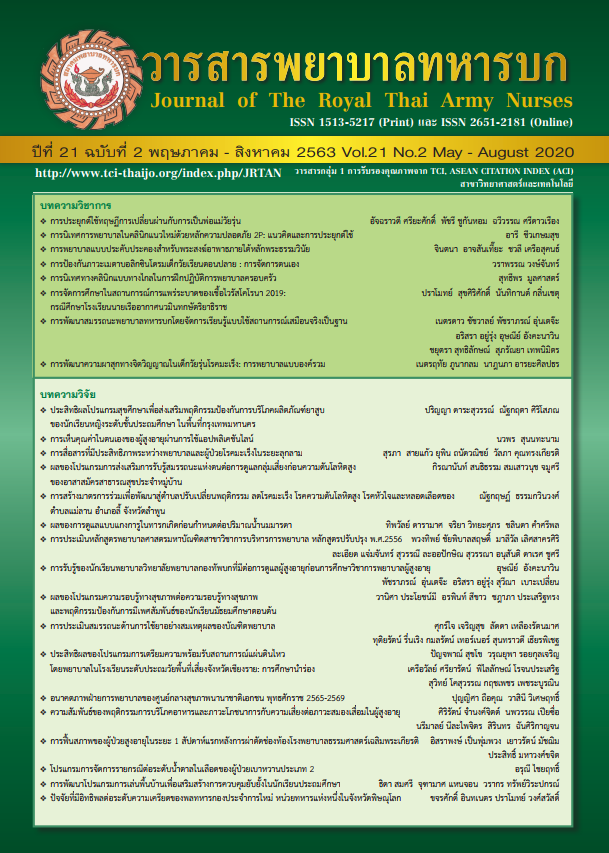Effect of S SMILE Instructional Model based on Contemplative Education for Enhancing Nursing Student’s 5 Skills subject to Thai Qualifications Frame Work for Higher Education
Keywords:
S SMILE Instructional Model, Contemplative education, Thai Qualifications Framework for Higher EducationAbstract
This research is a quasi-experimental study, one group pre-test post-test design, with an aim to investigate the effects of the application of S SMILE Model based on contemplative education for enhancing nursing student’s 5 skills subject to Thai Qualifications Framework for Higher Education. The sample group included 80 first-year nursing students in the Faculty of Nursing Naresuan University who had enrolled the course “Humanized Nursing Care”. The research instruments consisted of 1) Experimental tool which was the instructional model “S SMILE Model” based on contemplative education comprising 6 components as follows: 1) Space 2) Self-reflection 3) Meditation 4) Integral Life Practice 5) Listen Actively and 6) Evaluation 2) Data collecting tools were questionnaire for evaluating 5 skills subject to Thai Qualifications Framework for Higher Education and questionnaire for assessing satisfaction toward given instructional model. Statistics used for data analysis included percentage, mean, standard deviation, t-test.
The research findings suggested that by applying the instructional model, post-test scores for nursing student’s 5 skills subject to Thai Qualifications Framework for Higher Education were significantly higher than that of pre-studying ones at statistical significance of 0.001 while satisfaction score was significantly above the required level with statistical significance of .001.
Downloads
References
Chewawiwan N, Chongniramaisatit T. Lessons for the 21st Century. UK: The Random house group limited; 2019. (In Thai)
Songkhang I. A medical complain situation in public health. In : National Health Security Office provided the meeting for capacity development in customer service center; 2019 January 9; Avani Khon Kaen Hotel. Khon Kaen; 2019. p1.
Assadornsaranee S, Phukrongnak K. Contemplationoriented transformative learning in order to cultivate integrity in the learners.Journal of education Faculty of education Srinakharinwiroj University 2010; 18(2): 225-241. (In Thai)
Palmer PJ, Scribner M. The courage to teach: exploring the inner landscape of a teacher’ life. 10th ed.San Francisco: John Wiley& Sons; 2007.
Mezirow J. Learning to think like an adult: Core concepts of transformation theory. In: Taylor E, Cranton P, editors. The Handbook of Transformative Learning: Theory, Research and Practice. San Francisco: Jossey-Bass; 2012: 73-96.
Mezirow J. Learning as transformation: Critical perspectives on a theory in progress. San Francisco: Jossey-Bass; 2000.
Saraketrin A, Rongmuang D, Chantra R. Nursing Education in the 21st Century : Competencies and Roles of Nursing Instructors. Journal of The Royal Thai Army Nurses 2019; 20 (1). 12-20. (In Thai)
Palmer PJ. The courage to teach guide for reflection & renewal. 10th ed. San Francisco: John Wiley & Sons; 2007.
Department of nursing. Critical of Course syllabus for second semester of graduate years 2014; 2015 April 15 ; Hangnokyong Meeting Room , Faculty of Nursing, Naresuan University; Phitsanulok ; 2015: 5. 10. Anagwit N. Contemplative education curriculum development for nursing student. Dissertation of Docteral Degree, Khon Kaen University; 2012 [In Thai].
Anan K, Boontham A, Cheaplamp S, Songsawangthum M, Chaopipat Y, Bualuang T. The Development of Empathy in nursing students using the Comtemplative Education. Journal of The Royal Thai Army Nurses 2018; 19 (September-December) 68-77. (In Thai)
Rattanawimol C, Kaewurai W, Hingkanont P. The Instructional Model Development focusing on Standardized Patient with Circle of Trust to Enhance Learning Happiness forNursing Student. Journal of Nursing and Health Sciences 2015; 9(3):179-192. (In Thai)
Khammanee T. Concept of Teaching. Bangkok: Chulalongkorn University Press; 2017. [In Thai]
Wongsaree C. Teaching to Critical thinking in Generation Z Nursing Student : A Review of Literature. Journal of The Royal Thai Army Nurses 2019; 20 (1). 21-30 (In Thai)
Knaak S, Karpa J, Robinson R. They are Us – We are Them : Transformative learning through nursing education leadership. Journal of Mental Health commission of Canada; 29 (3).116-120
Espey M. Enhancing critical thinking using team-based. Higher Education Research & Development 2017; 37(1). 15-29 17. Joyce BR, Weil M. Models of Teaching. 6th ed. Boston: Allyn and Bacon; 2000
Downloads
Published
How to Cite
Issue
Section
License
บทความหรือข้อคิดเห็นใดใดที่ปรากฏในวารสารพยาบาลทหารบกเป็นวรรณกรรมของผู้เขียน ซึ่งบรรณาธิการหรือสมาคมพยาบาลทหารบก ไม่จำเป็นต้องเห็นด้วย
บทความที่ได้รับการตีพิมพ์เป็นลิขสิทธิ์ของวารสารพยาบาลทหารบก
The ideas and opinions expressed in the Journal of The Royal Thai Army Nurses are those of the authors and not necessarily those
of the editor or Royal Thai Army Nurses Association.






